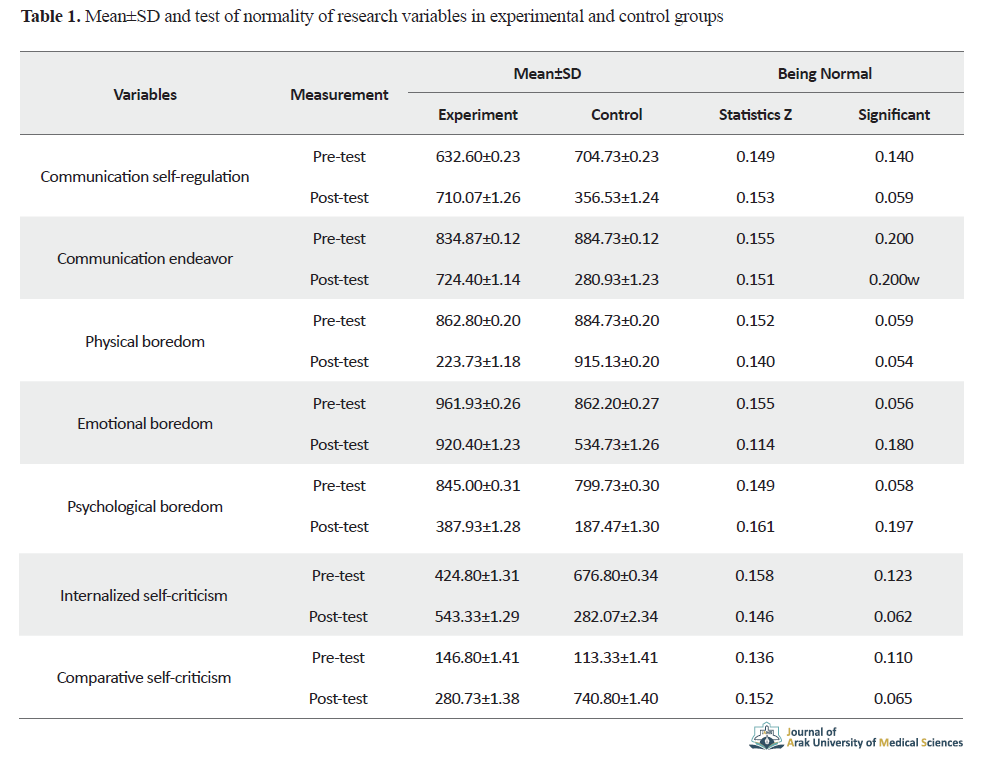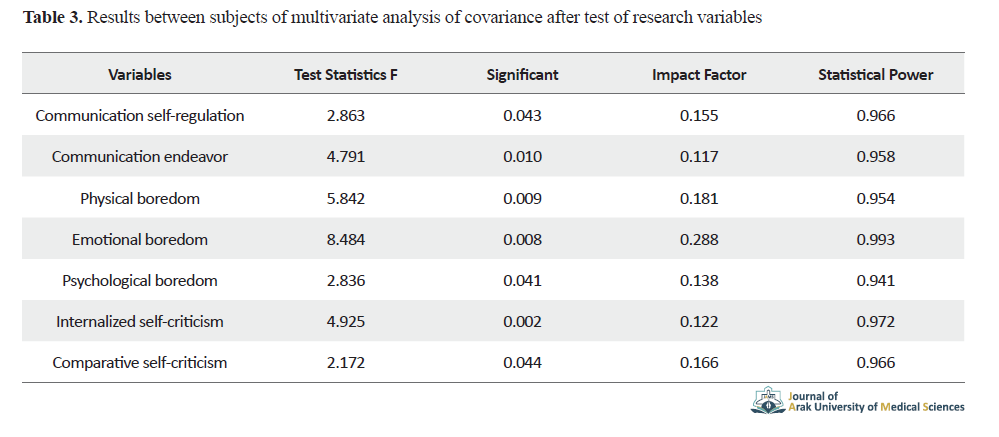BibTeX | RIS | EndNote | Medlars | ProCite | Reference Manager | RefWorks
Send citation to:
URL: http://jams.arakmu.ac.ir/article-1-6221-en.html
2- Department of Psychology, Tonekabon Branch, Islamic Azad University, Tonekabon, Iran. ,
1. Introduction
hen after one year of regular intercourse or artificial insemination with no use of contraceptives, no pregnancy occurred, it is defined infertility [1, 2]. The prevalence of infertility creates many problems for infertile people [3]. In addition, the psychological impact of infertility on married life is often associated with family problems [4]. Therefore, infertility in couples creates conditions that can have negative effects on marital relationships, including self-regulation [5-7]. Infertility is also associated with problems and affects their boredom [8].
In addition to these problems, women who suffer from infertility have higher self-criticism [9]. Due to the mentioned problems in infertile women, the use of psychological interventions can be effective for these women. Mindfulness therapy is important in improving the problems of these women [10]. Mindfulness is a type of psychological therapy designed to prevent recurrence of depression, especially in people with major depression [11-13].
2. Materials and Methods
The present study was an experimental design with pre-test/post-test design with a control group. 2 groups of 15 people were selected and the experimental group was trained in 8 sessions 90-minute of mindfulness. In this study, descriptive statistics and inferential statistics including multivariate analysis of covariance were used. The tool was a questionnaire. Marriage Self-Regulation Scale Wilson et al. [14]: This scale contains 16 questions [15].

In Iran, Cronbach’s alpha of communication is 0.73 and endeavor is 0.72 [6] and for communication is 0.81 and endeavor is 0.83 [14]. In another study, the correlation coefficient was 0.86 and the effort coefficient was 0.83 [16].

Pineas Boredom Questionnaire [17]: which contains 20 questions. A Cronbach’s study obtained 0.85 reliability [18]. Cronbach’s alpha was also 0.92 [19] In another study, alpha was 0.89 [20] (Tabels 1, 2 & 3).

The Thompson and Zarov Self-Criticism Scale [21] has 22 questions. In Iran, Cronbach’s coefficients have been calculated in the range of 0.88 to 0.89 [22]. In another study, Cronbach obtained 0.82 [23]. In this study, mindfulness is based on recognizing 8 sessions 90-minute according to the program of Segal, Williams and Tizdel [11] and Dimijian, Goodman, Felder, Gallup, Brown, and Beck [24], who were trained in the experimental group.
3. Results
The research results are in line with some other research results done by other researchers [11, 24, 25]. Explaining the effectiveness of mindfulness therapy on marital self-regulation, it can be said that cognitive mindfulness therapy, which is a type of cognitive therapy that makes the connection between mood, thoughts, feelings and physical feelings around it possible in the moment and reduces spontaneous thoughts of depression and stress caused by illness and marital problems [11]. Infertile people with a high level of awareness can create a constantly dynamic and flexible environment in their lives by being aware of time and not being afraid of change.
4. Discussion and Conclusion
This dynamic and flexible environment prevents the growth of chronic conflicts and long-term psychological and emotional distances; These conflicts will themselves create a chain of subsequent problems. Importantly, infertile women with a high mindset pay close attention to their own and their husband’s point of view, and this point as a means going to keep relationships dynamic and prevent coldness of relationships, and ultimately increase the quality of relationships and marital self-regulation in life.
In explaining the effectiveness of cognitive-based mindfulness treatment on marital boredom, it can be said that in a mind-conscious relationship, existing ideas and attitudes can be exchanged more. This conscious awareness creates lasting effects on couples to solve problems with respect, intimacy, and empathy. Finally, it can be said that people, as a result of cognitive-mindedness treatment, accept experiences as separate elements from themselves and as a transient state and as a subject for change, and so instead of exploring the subject or cognitively or behaviorally avoiding the experience, which will both be painful, they accept and eventually internalize these experiences, like other experiences that are neutral or not emotionally charged [26, 27]. as a defense, it can be explained.
Ethical Considerations
Compliance with ethical guidelines
This article was ethically approved by the Islamic Azad University of Tonekabon (Code: IR.IAU.TON.REC.2018.030) approved by the Islamic Azad University of Tonekabon. The authors also explained the purpose of the research to the participants in order to observe ethical principles.
Funding
The present paper was extracted from the PhD. dissertation of the first author, Department of Psychology, Tonekabon Branch, Islamic Azad University.
Authors' contributions
All authors met the standard writing criteria based on the recommendations of the International Committee of Medical Journal Publishers (ICMJE) and all contributed equally to the writing of the work.
Conflicts of interest
The authors declared no conflicts of interest.
| Rights and permissions | |
 |
This work is licensed under a Creative Commons Attribution-NonCommercial 4.0 International License. |









